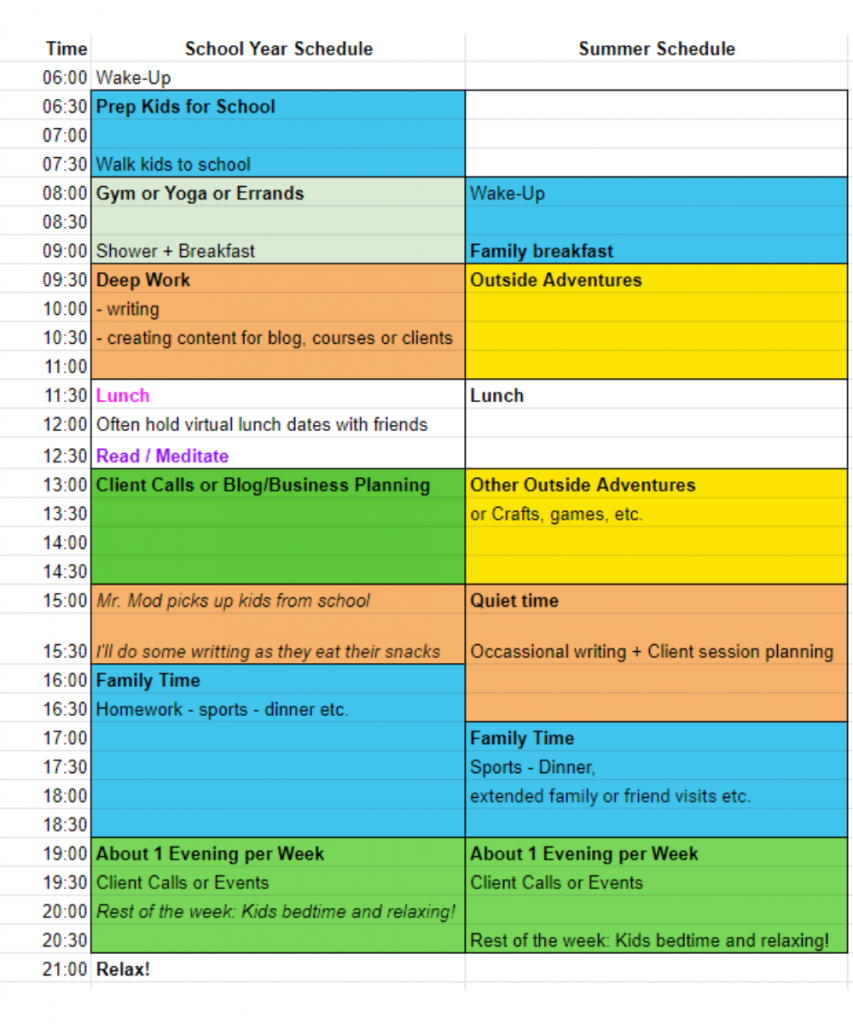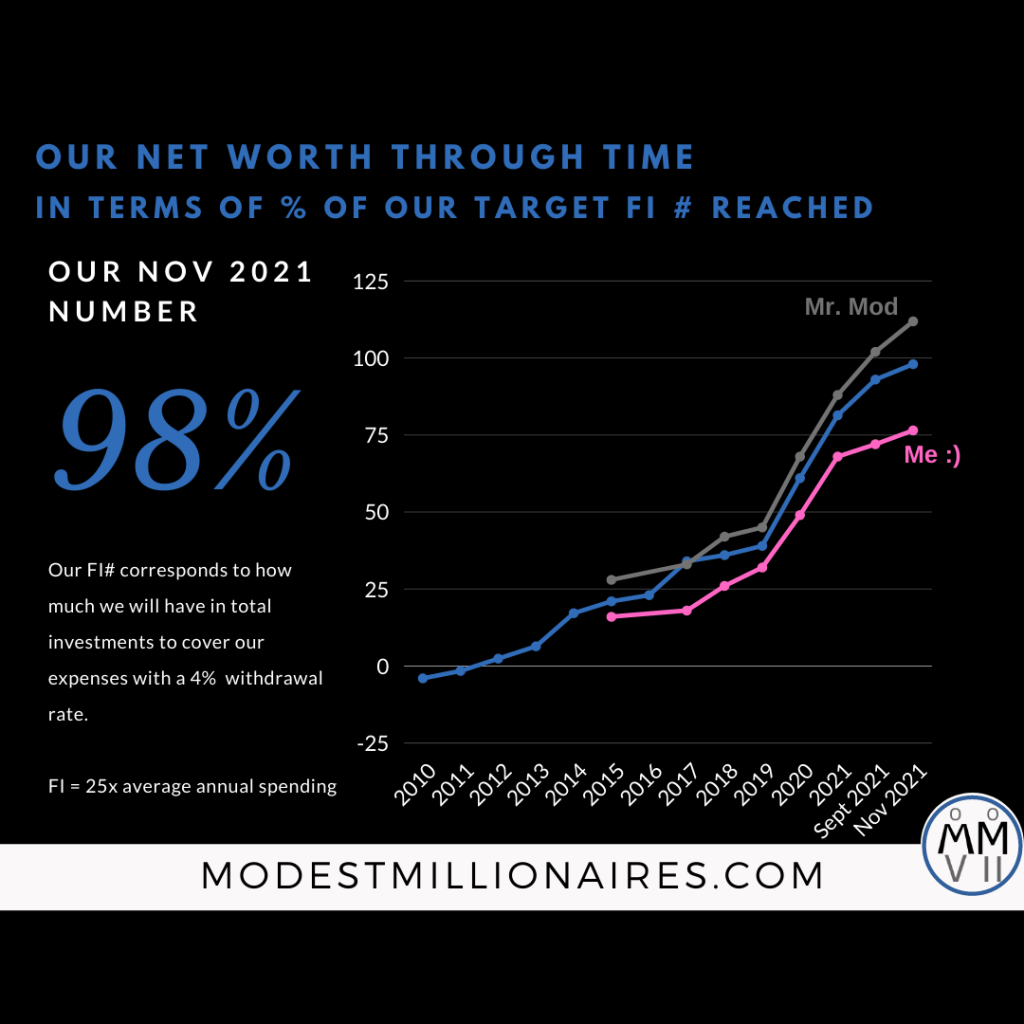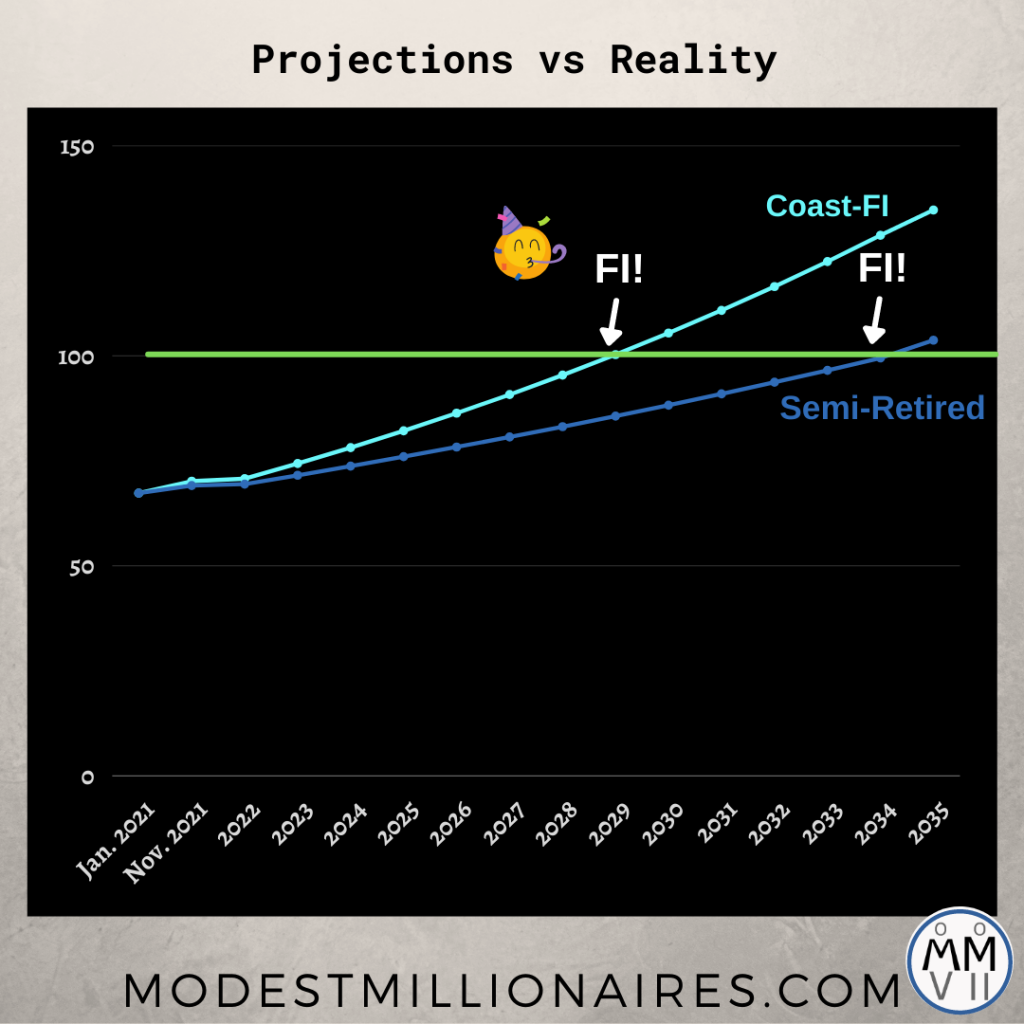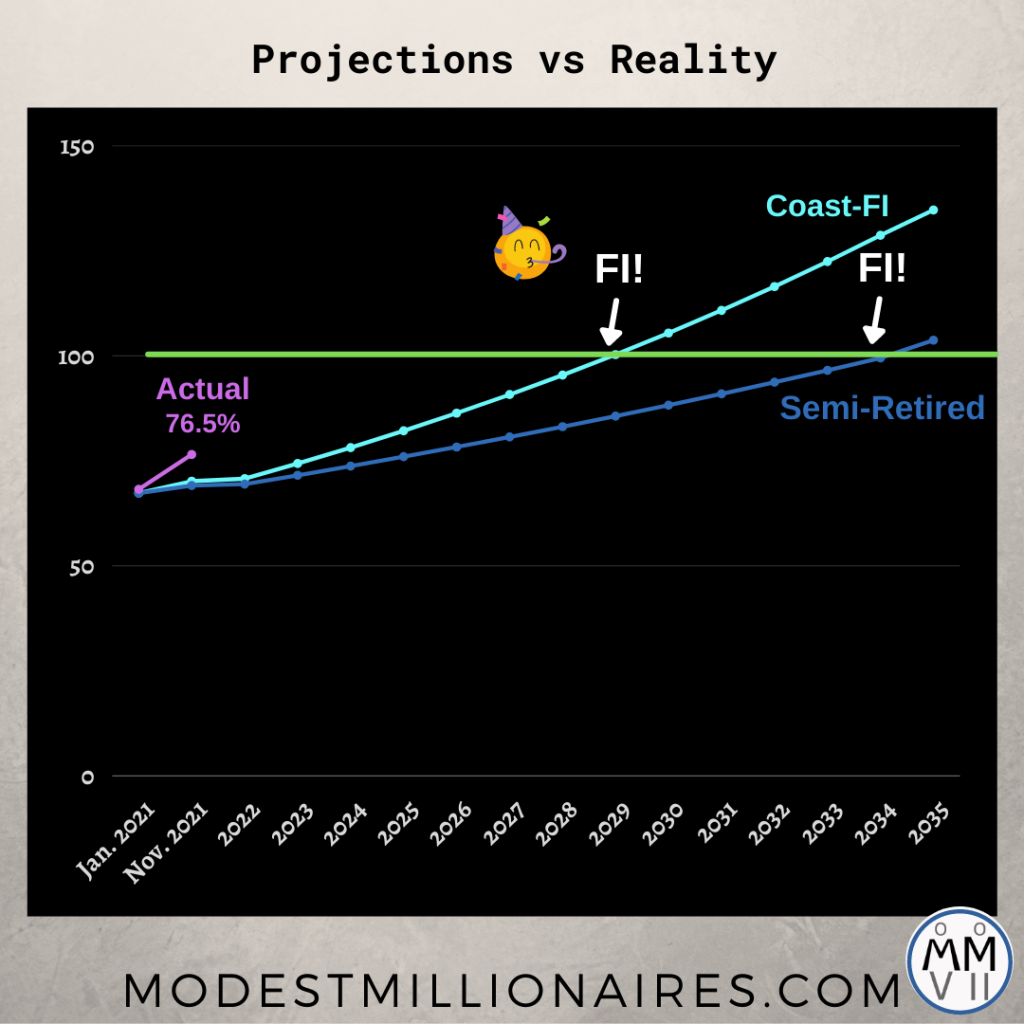About a month ago, I officially resigned from my 9 to 5 and am now semi-retired. I run my passion business on a part time basis while withdrawing up to 2% of my investments to cover my share of our cost of living. This will allow my investments to continue to compound to my full FI by my early 40s.
After doing this as a side-hustle for the last few years, I realized I would want to continue running my financial education business even when full FI. This led me to feeling comfortable using the term semi-retired for this new way of funding my cost of living.
I reached out to my Twitter & Instagram communities to find out your questions about the fact that I am semi-retired. Today I am taking the opportunity to answer those questions. Before we get into it, let me add a few details & specifications which are important when considering my semi-retired status.
I’ll be holding a FREE workshop on Planning to Downshift on your Journey to FI on December 9, 2021. Sign-up here to RSVP and receive the replay!
What Does Being Semi-Retired Look Like for Me?
Approach to our Family’s Finances
Mr.Mod and I have a separate/combined approach to our finances. This is similar to how Angela from Tread Lightly Retire Early & her husband manage their money. We split all our household, food and childcare costs 50/50 as we’ve always had pretty similar salaries all along our careers. We both want to individually reach our FI numbers. In fact, Mr.Mod already reached his FI number in August of this year. He’ll FIRE before 40 but enjoys his current projects/team.
That being said, I don’t depend on his income or portfolio to cover my share of our costs, which is exactly the same amount as his share of our costs. We do benefit from the health & dental benefits from his work. Yet, he could quit anytime and we’d be fine.
This was incredibly important for me to make clear prior to embarking on my sabbatical to test out Coast FI. I wanted Mr.Mod to feel comfortable to make any changes he needed if ever his career became detrimental to his well being. Or simply if he has the desire to do so.
These circumstances (the business I love running, having a spouse that is fully FI to share those big costs – housing, utilities, food, childcare), are important factors for me to consider myself semi-retired & comfortable to take different risks than others.
Typical Semi-Retired Day
My typical semi-retired day varies depending on the period of the year. While the kids are in school, I have more time to dedicate to my business and plan my projects out for that period of the year.
During the summer, I cut down my hours to maintain the coaching clients I have already onboarded. I focus on enjoying the summer with my family. As such, here’s a glimpse of what these two different schedules look like.

These two schedules leave plenty of time for the values and activities that I want my financial independence to support. These can be summed up as: spending more quality time with my family & friends, learning & pursuing my passions, and incorporating a sense of adventure into our life.
During the school year, I do about 4 to 5 hours of work per day with an ideal maximum of one evening per week with client calls. That adds up to around 25 hours per week during that period. Plus I take off for all holidays and almost every single PD day, unless I have a self-imposed deadline or client meeting to respect. Mr.Mod joins us for all the holidays he gets off and lots of those PD days.
As for the summer, our time was not necessarily as structured. We really flow with the weather, our moods and the various activities we like to do during the summer. These activities include spending time sailing, visiting friends and extended family in other cities, hiking, visiting playgrounds, etc.
Your Questions
Benefits of Being Semi-Retired
What are your favourite benefits from being semi-retired? (Chrissy from Eat Sleep Breathe FI)
There are so many benefits to being semi-retired. I’d say the main one is that oh so sweet flexibility it provides me! It’s been incredibly helpful to navigate the pandemic as parents to young kids. Shifting things around when a kid starts showing symptoms and needs to get a Covid test is quite simple.
That flexibility also gives me the opportunity to rest when I need to rather than try and power through to stick to a 9 to 5 schedule.
How do you feel at the end of the week? Is it usually the same feelings or a roller coaster ? To do with the decision I mean😊 ( Simplifytofi):
At the end of the week, I feel much more energized. I still have up and downs, of course, but nothing compared to when I was working in a big organization on a full-time basis. It definitely feels like my mood is more stable and predictable.
Additionally, the nature of my work is so different. I used to deal with complaints and very technical files. Now with the subject of financial education & coaching, while some of my clients sometimes come to me in difficult circumstances, my role is one of hope and empowerment.
Furthermore, the feeling of working on something I am passionate about is quite rewarding. I find myself feeling proud of what I have accomplished and looking forward to relaxing with the family on the weekend.
In terms of how I feel about my decision itself, I’ve continued to feel happy with taking the leap and excited about future projects. 🙂
Comfort to take the leap / Fears of Being Semi-Retired
What percentage of your full FI number did you reach before you felt comfortable semi-retiring? (ConPoint )
I wouldn’t say there was a specific percentage but seeing the compounding at work was a big confidence booster in making the leap.
When I made the decision and planned my sabbatical, we had jointly reached 80% of our FI number and that felt incredible! As you can see below, with how the market has been on fire, we have now, about a year later, reached 98% of our FI number which feels completely ridiculous.

That’s the interesting thing though, while the number looks good on paper, it doesn’t change that much in how I feel. It’s only one of many tools to help increase my comfort.
I’d say it’s really more of the mindset work that has made a huge difference in getting comfortable with taking the leap.
Things like:
- Discussions with Mr.Mod about my desire for him never to feel stuck in a job if I decided to slow down prior to reaching my full-FI.
- Projections showing the chances of success and of reaching FI in optimistic as well as conservative scenarios.
- Contingency plans for all the “what-ifs” and fears I had about taking the leap.
How did you get comfortable with starting to withdraw from your portfolio? ( Jessica from The Fioneers )
Specific to getting comfortable withdrawing from my portfolio, prior to making my decision to take a sabbatical, I drew up lots of various projections.
As you can see below, this Semi-Retired projection where I withdraw 2% of my portfolio every year, has me reaching FI somewhere around 2034, so when I will be 46.

Knowing that I was taking the leap into entrepreneurship, I realized that as I built up this business, I might need to invest in myself. This might result in higher costs for the first couple of years as I experiment with software, take some courses and continue to learn to offer the best education and value for my clients.
I didn’t want to feel stressed, nor did I want to feel pressure about taking on projects just for the sake of making a buck. I get to be very picky on what I work on thanks to feeling comfortable and secure financially.
Furthermore, I realize that there may be years in the future where I actually do not need to withdraw that 2% as my business grows. I’ve also been keeping a close eye on how reality compares to my initial projections in order to readjust if need be, but with Mr.Market’s performance of the last year, I’m actually way ahead.

What if some big black swan event happens? What will you do? ( Jessica from The Fioneers )
Love this question as I worked hard on building contingency plans before taking the leap.
For example, I’ve thought of as many ways as I can to generate enough income to cover my share of our cost of living. These vary greatly in nature from freelancing, to tutoring, to being an occasional substitute teacher (which is highly in need right now), to taking on consulting roles for my previous employer and more.
The fact remains that since our mortgage is paid off and our costs are relatively low I don’t need to work that much to cover my cost of living. Making little bit extra to add into our investments is also realistic. We’ve estimated a FI number that has a buffer of about 10 to 20% to travel or do some home improvements in the future. If there was a black swan event, simply cutting that extra spending makes a big difference.
Worst comes to worst, we could always rent out our home for more than enough to cover rent in a lower cost area or other country. In the financial logistics section below, you’ll also see that I’ve included other ways of cushioning our plans and of ending up having more than we would need in the future.
What are your biggest downsides to being semi-retired? Chrissy @ Eat Sleep Breathe FI :
While there are a lot of benefits to being semi-retired, there can be downsides too. In answering this question, I’ve had to resist comparing entrepreneurship to employment. That’s definitely been something to adapt to in itself. For example, it took me a while to get used to giving myself the flexibility to take an unplanned day off when I want or need to.
Specific to being semi-retired, I’d say that I regularly need to assess and work on productivity guilt. As I am not fully FI yet, I could obviously always be earning more and get there faster. So it does take some work to conquer those limiting beliefs whenever they show up. I do suspect that even if I was full FI, that would still be something to work on simply because that’s years of programming in the making!
Semi-Retired With Kids
What do your kids think? Have you talked to them about it? If so, how? (Chrissy from Eat Sleep Breathe FI)
My kids are still relatively little. They were 6 & 5 when my sabbatical began. As such, it’s perhaps not something that we have discussed with them as clearly as if they were older.
That being said, they have celebrated with us that I was now my own boss doing work that I very much enjoy. They’ve barged into client sessions at times so they have some understanding that my work involves video meetings around the subject of money . It’s kind of like when they had online school they say. They see me write often too, my son actually typed out a few words in this post as he wanted to help out ;).
They have friends whose parents do work when there are PD days and during the summer so they do see that their situation is different. We have lots of conversations around this.
We talk about the choices and privileges that led us to having the ability to have less working days than others while also discussing the tough circumstances that others might face preventing them from that flexibility. Or about how one profession might have different schedules than another and how it was different for us growing up.
These conversations remain short and quick though, as they have much more pressing matters to attend to, such as catching a grasshopper or doing the perfect cartwheel. With time I am sure more questions will come and I look forward to these conversations.
With kids, how do you plan to capitalize on this new freedom? Travel with them? Enrich their learning? World schooling? ( Tyler)
While we definitely want to do some traveling with them, especially once this whole pandemic thing is more under control, I think capitalizing on this new freedom has so many layers when it comes to parenting.
I believe kids feel our stress very deeply. I’ve had moments where I could see I was impacting them negatively when I did not have the space needed to process the high level of stress I was dealing with prior to my sabbatical.
Since making the leap, the amount of patience I have for my kids feels like it has grown exponentially. I don’t finish my work days feeling completely depleted. Instead, I feel energized! The new found flexibility that being semi-retired offers means that I’m not alarmed when we experience unplanned events in our schedule.
I hope this patience and ability to face challenges with calm serves as a good model for them. I’m glad it allows me time to focus on connecting with them on a daily basis. I want them to be resilient and kind people that have what they need to live a happy life while bringing good to the world. It feels like using my freedom this way serves to increase the chances of that coming true.
With regards to travel, that is definitely something we love to do and want to repeat. In January 2020, we spent a full month in Mexico (talk about timing!) and I really enjoyed that length of time. We’ll probably repeat the experience in different areas of the world every couple of years. I’d also like to do a period of 6 months of !homeschooling” and travel, possibly in 5 years or so.
Financial Logistics
Have you changed how you invest? Why or why not? (Mark Seed from myownadvisor )
I have not yet changed how I invest. I will very soon receive the transfer value of my pension though. I’ll be spending some time planning how I want to invest that money in my locked in retirement fund. I’m thinking of sticking to ETFs again, just like I currently hold in my RRSPs and TFSAs. Yet, I’ll possibly choose 2 or 3 selections that I do not currently hold and rebalance these on a yearly basis. I hope to write more on that process in the next couple of months.
Another area of our investment portfolio which we often think of making a change to is our rental condo. We have terrific tenants in there. That weighs on the keeping it side but it’s not the best investment in terms of cash-flow / profitability. Yet, I like having some money invested in real estate to diversify our portfolio. So perhaps when the time comes to sell it, we will reinvest in a different rental property.
Do you keep a cash wedge / larger cash fund now just in case? Why or why not? (Mark Seed from myownadvisor )
I initially kept a larger cash fund (a full year of expenses). Yet decided to change this strategy as the year went on. I monitored how I felt seeing that cushion get closer to six then three months of expenses. After that I got to see what it’s like to withdraw from my TFSAs to get that cushion back up to six months of expenses. I’ve seen that it’s both a logistically and emotionally simple process.
With semi-retirement status do you extend medical health insurance and if so how much are you paying monthly? ( Myprudentlife )
Currently we still have coverage through Mr.Mod’s employment. When he does leave his work, we will be purchasing some medical health insurance. While I have not received exact quotes on this yet, I have received estimates from other self-employed friends and readers. These range from 250$ to 550$ per month for various forms of family coverage.
How does CPP/OAS factor into your FI number? ( Tyler)
We do not include these in our FI number or future income projections. We wanted to have many buffers to pad our FI plans. So we don’t include any numbers that we don’t have as much control over. This includes CPP/OAS as well as any potential inheritance we might receive should our parents pass away. It also does not factor in other government benefits like the Canadian Child Benefit. We decided to do this as these types of benefits can be modified depending on which party is elected & their priorities.
Do you still contribute to RESPs, TFSAs, etc despite the fact that you are semi-retired? ( Maman_investie)
We do contribute to our kids’ RESPs and consider this as part of our expenses. When possible, grandparents contribute to these instead of gifts. We plan to maximize the education grants so that comes to investing 2500$ annually for 14 years for each kid.
As mentioned we simply consider being part of our expenses. Besides, once they are teenagers I am sure they will be eating for that much more lol.
As for my TFSAs and RRSPs I am not contributing to these currently. I’ve actually withdrawn from my TFSAs this past year which was quite a whole new feeling to get used to.
Conclusion
There you have it! That is what being semi-retired looks and feels like for me in this present time. My circumstances will likely evolve and change with time. I will keep you all posted on what that looks like in the future. Most importantly, right now I feel pretty happy with what my life looks like. I am incredibly thankful to have all of you following along for the journey!
Are any of you thinking about implementing a semi-retired approach in your journey? Please share your plans or other questions for me in the comments below.
I’ll be holding a FREE workshop on Planning to Downshift on your Journey to FI. Sign-up here to RSVP and receive the replay!

Hello, my friend! I loved this! What a great way to give all of us some insight into your semi-retired life. This will be a great post to share if I ever need to explain the benefits and logistics of semi-retirement.
Thanks for answering my questions, and sorry that I asked so many, LOL!
Thanks friend! Please don’t apologize for all your questions. I chose to respond to all of them as they were super interesting to me and I believe these answers will be insightful to readers :). In fact, I’m the one who should be thanking you for asking all of these terrific questions. So thank you! 🙂
The thing is you can define your life any way you want. And to be sure some will disagree with your definition, but not me. I did not need to ever earn another dollar when I retired six years ago. Not because I was a great personal finance guru but because I was highly paid and have a genius of a domestic engineer as my partner. But I chose to work about eight hours a week doing some light consulting for entertainment purposes and to kind of off ramp myself from a demanding career. Anyway I pulled in a nice income for very little effort and while I felt fully retired the fact that we weren’t touching our investments to fund our lives made me look employed to many. My personal definition is you are still retired, no matter how many hours you work, if you could stop working tomorrow and you would not run out of money. But that is just my definition. Now I’m barely working even one hour a week and still feel fully retired.
Very true! In the end, over and above how we define our lifestyles, the most important part is how we personally feel financially secure to design our lives to bring us joy and satisfaction.
Congratulations MM! Not so many be able to call themselves semi-retired, enjoy the passion of what they are doing and money isn’t much of an issue. So happy for you and BTW your site is awesome!
Thanks so much Rommel! It’s been lovely and I am excited to continue sharing the journey on here :).
Your post was highlighted in my recent FIRE Insights Survey. And low and behold your schedule is pretty much my schedule. I can confirm that the Deep Work happens between 9:30-12 when the kids are at school. Cheers to the Semi-retired life!
That’s awesome! Definitely been the golden hour for Deep Work here as well. I’ll sometimes get a little boost around 2 but this is normally interrupted by their return from school lol. Cheers indeed!
Hello Ms Mod,
Happy New Years and hope you and your family are enjoying the holidays. I myself have binge-read all your articles within a week (I want to say probably less than that haha). They were both informative and also entertaining.
I thought sabbatical leave was absolutely brilliant. Being an accountant will not allow me to do that for first six months but perhaps I can try for the later half of the year in the future.
I would say I am pretty close to FI (only 20 years away lol). My finance is in order; but I just need to find my passion (which is what I have been struggling with).
I was able to get some clarity on spending (which one is more important than the others). Also, I stole your expense tracker template (I will be using it 2022 and onwards haha).
Congratulations on leaving the 9-5 job. I have been reading up on lots of finance/FIRE/FI related blogs and articles for the past few years and got to say I am actually inspired by people (including yourself) who were able to pull the trigger.
Keep up the good work!
Cheers,
John
Hi John! Thank you kindly for your comment & taking that time to read my content.
I’m sorry to only be responding now! I’m blaming the holiday period for having completely forgotten to respond!
I can see how taking leave for the first part of the year as an accountant could be tough. Definitely do consider it for later on though!
I’ve found that getting back into finding “fun” in my life has greatly benefitted from time away from a 9 to 5 schedule. Sort of like getting out of the stressful grind left room for curiosity and interests to return.
Perhaps some extra time off could facilitate finding your passion !
Best of luck on your own journey!